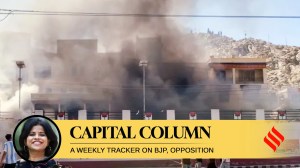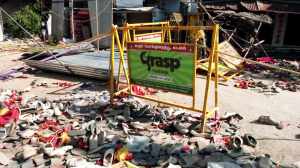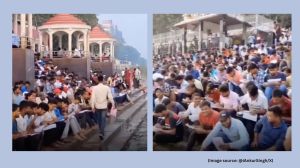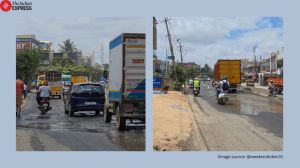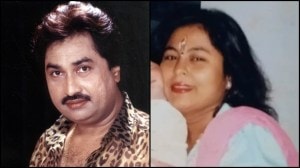In-house problems ahead of power anniversary
On the eve of their third anniversary in power in the state, the ruling allies in Maharashtra are both grappling with a divided house.

On the eve of their third anniversary in power in the state, the ruling allies in Maharashtra are both grappling with a divided house.
Both the parties swear by secularism and claim to be messiahs of Dalits and minorities. Both accuse the Shiv Sena and BJP of being “communal” and vow to do everything to keep out the saffron alliance out of power. But the growing differences between the Congress and NCP ahead of the October 31 anniversary are becoming increasingly apparent. In the local body elections held recently, the allies not only fought against each other but, at places, even aligned with either the Sena or the BJP to keep the other one out. So the Congress is in a post-poll alliance with the Sena in nine civic bodies and the BJP in 16, while the NCP has tied up with the Sena in 11 and with the BJP in seven local bodies. The most glaring was the NCP-Sena alliance in the Pune Municipal Corporation to wrest power from the Congress.
Under the circumstances, the chances of a pre-poll alliance between the Congress and NCP in the event of a snap poll or the scheduled Assembly and Lok Sabha elections in 2009 are rare, though the parties may tie up after the elections.
But apart from the love-hate relationship with each other, the Congress and NCP are also facing intra-party friction. Chief Minister Vilasrao Deshmukh’s detractors, led by Maharashtra PCC chief Prabha Rau, and including AICC in-charge of state affairs Margaret Alva, have been seeking a change of guard highlighting his shortcomings. Much to Deshmukh’s embarrassment, his own party has released fact-finding reports on issues like farmers’ suicides, the sugarcane crisis, malnutrition and power problems, indicting his government for messing up things.
Deshmukh has managed to survive largely on the TINA (there is no alternative) factor. His supporters also claim the blame lies with the Congress for not doing enough to highlight the “achievements” of his government.
The NCP, too, is facing problems. Its chief and Union Agriculture Minister Sharad Pawar’s “autocratic” style of functioning and his attempts to promote his clan (through his daughter Supriya Sule and nephew Ajit Pawar) at the cost of other senior leaders from non-Maratha castes have invited the wrath of several of his lieutenants. While most of them dare not speak publicly, OBC leader and state PWD minister Chhagan Bhujbal has covertly voiced his protest at being marginalised in the party.
Even Dalit leader and Lok Sabha MP Ramdas Athavale is in a defiant mood. Athavale’s Republican Party of India (A), which is an ally of the NCP and has the largest Dalit following in the state among the dozen RPI factions, has been accusing Pawar of using the Dalit vote bank without keeping promises of sharing power.
Their concerns are yet to be addressed by Pawar, whose political strength in the state depends on the votes of Dalits, OBCs and minorities, and not just Marathas. Perhaps, sensing the heat, the NCP has floated a new social outfit, “Dalit, OBC, Muslim Manch”, to hunt for fresh volunteers and local leaders to consolidate its position.





- 01
- 02
- 03
- 04
- 05








